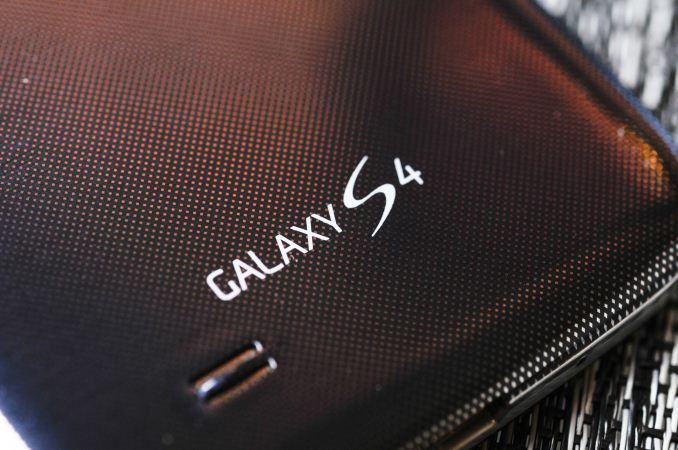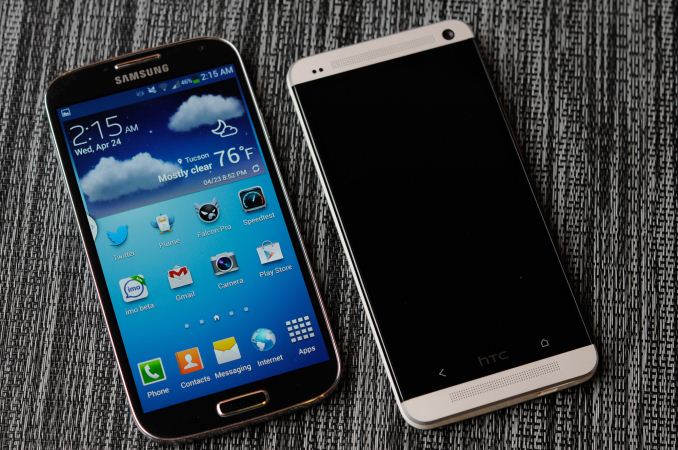Samsung Galaxy S 4 Review - Part 1
by Brian Klug on April 24, 2013 12:01 AM ESTFinal Words
Samsung has done a tremendous job creating a global following not only for its brand, but also for its software. In studying Samsung and its devices it becomes quite clear that although many enthusiasts yearn for pure, unadulterated Android, there are seemingly big pockets of the market who have grown used to (and maybe even desire?) Samsung's TouchWiz user experience. It really is a very clever strategy on Samsung's part. If you deliver products that your users appreciate, and deliver a uniquely different user interface at the same time, you begin to create an appreciation for that user interface as well. All of this flies in the face of what we as reviewers normally seem to prefer, but Samsung's success is proof of the fact that not everyone absolutely detests OEM customized Android.
Samsung's existing user base is likely the easiest to talk to about the Galaxy S 4. Compared to any previous Galaxy S device, the SGS4 is a clear step forward in all of the right areas. The display is higher resolution, the SoC is significantly faster, there's better WiFi (and connectivity depending on what generation of Galaxy S you're talking about) and obviously the Galaxy S 4 runs the absolute latest version of Android. Even on the camera side, Samsung has improved imaging performance over the Galaxy S 3 this generation thanks to its use of a wider aperture lens system. If you're a happy owner of a Samsung Galaxy S/S2/S3, you'll likely be a happy owner of a Galaxy S 4.
It's when you compare the Galaxy S 4 to its chief technical competitor, the HTC One, that the discussion becomes more complicated. HTC and Samsung take very different approaches to nearly every aspect of their flagship smartphones. Whether it's display (LCD vs. Super AMOLED), camera (low light vs. well lit performance), or software (subtle Sense 5 or feature filled TouchWiz), you couldn't pick two more different players in the Android space. So which is better?
It really depends on what you value more. The One's camera delivers better low light performance, while the Galaxy S 4's camera delivers better performance in well lit (e.g. outdoor) scenarios. The One's software customizations are definitely more subtle and out of your way, while Samsung's approach is much more feature overload and in your face. It's difficult to say for sure given our Sprint review unit, but HTC likely gets the slight edge in battery life based on our results here today (although these two devices can be close competitors depending on the workload). Samsung does integrate the faster SoC, despite both the Galaxy S 4 and HTC One shipping the same Snapdragon 600 platform. Samsung and HTC remain on opposite sides of the removable battery/microSD fence, if those two things matter to you then Samsung is the obvious choice. Finally there's a question of how much you value/desire an all-metal smartphone. For some, Samsung's choice in materials is going to continue to be a very big issue.
At the end of the day, the Galaxy S 4 is an evolution of the Galaxy S 3 in pretty much all of the areas you'd expect it to be. Whether or not that's what you wanted in a new Android smartphone is going to vary from one person to the next. The good news is that you at least have a choice.












335 Comments
View All Comments
Roffles12 - Wednesday, April 24, 2013 - link
fans of the solid aluminum chasis are a very vocal and illogical minority. very annoying in fact. i have yet to hear any logical argument for why it's better. "it feels nicer in the hand" isn't a reason, but rather a completely subjective opinion. by my logical observation, the aluminum phones are actually more fragile and prone to scratching. aluminum is also more rigid which means it will have greater energy transfer on shock impact, resulting in a greater chance of shock energy transferring to the screen, thus damaging it. you're almost forced to purchase a case to protect it.i think the sales figures for the gs3 alone show that most people don't care if their phone looks like a piece of jewelery. please save your opinions of vanity for the imaginary fashion show in your head. i much prefer polycarbonate plastics for logical reasons. i've been using my gs3 for a year without a case and it looks just like new. if i want to be flashy, i'll wear my nicest watch. my phone is for functionality, so the gs3's build is par for the course. The 45 total second battery swap of a GS3/4 (thanks for flexible plastics) compared to 3.7 hour charging for the HTC One (thanks to a solid metal frame) is all that really needs to be said on the matter. case closed. argument over. shup up. go away.
Crono - Wednesday, April 24, 2013 - link
I like how you dismiss a view as being "a completely subjective opinion", then proceed to give your opinion, " i much prefer polycarbonate plastics", and conclude with a rather immature and unconvincing, "shup up. go away."Truth is some people prefer a solid aluminum body for the same reason one might prefer a more aesthetically premium vehicle. A phone is a tool, but when you are talking about high-end specs - and the GS4 is only marginally better CPU-wise in real-world, observable performance, about equal in other areas, and lower in some - a better quality chassis might make the difference.
I don't care if someone prefers the GS4 for whatever reason, but stop pretending (and apparently you are by virtually putting your fingers in your ears with that last comment) that Samsung doesn't make cheaper casing and without offering a lower price for the end consumer.
It's not even the fact that it's plastic or polycarbonate or whatever you want to call it, as Nokia and HTC make quality plastic bodies. There isn't a good excuse for cheap looking and feeling bodies, even if it's semi-durable without a third party case. This isn't the equivalent of an econobox in the car world, the Galaxy commands a high price.
If you really are satisfied with the Galaxy line, then feel free to complain when Samsung finally gets the message and decides to make truly premium-bodied phones: because they eventually will have to if HTC succeeds with the One.
Roffles12 - Wednesday, April 24, 2013 - link
There is nothing subjective about the fact that polycarbonate plastics and a better material choice for a hand held daily use device than aluminum because of its durability, elasticity, ability to absorb shock and ability to shape into different sizes and thickness while still maintaining those superior properties. I was obviously commentating on the weaknesses of aluminum in CONTRAST to polycarbonate materials. If you can't read between the lines of my comment and apply some common sense, then you need to go back to school. I'm done with you... go back to the verge where you can all have a circle jerk with your fragile tech jewelery.RealityMonster - Monday, April 29, 2013 - link
Actually, that's entirely subjective. The energy transfer argument is really only meaningful when you're talking about a device with moving parts or parts that are likely to break off because of the shock. The plastic back isn't really going to help the screen very much (that is, if the phone falls on its back, the screen isn't going to break, and if it falls on its front, the back isn't going to help), and there are very few parts inside the phone that are likely to move much at all given the impact. In fact, I see people with phones that have busted glass all the time, and the phone itself is still working. (I've seen both an SGS3 and an iPhone 4 working this way.)Plastic is more likely to shatter on impact (which is to say plastic shatters and aluminum won't), and if the plastic back falls and cracks, it probably won't snap back on anymore. On the MOHS hardness scale, aluminum is definitely higher than plastic, which means there are fewer things that can scratch it.
Maybe you don't think it's important what the body material is, but I don't think your bias against aluminum is particularly justified. Aluminum is going to have structural rigidity that the polycarbonate doesn't have, which is why you can use it structurally on the outside of the phone.
I'd actually like to know what the relative carbon footprint of the two materials is. On the one hand, aluminum has to be mined and machined, but plastic all comes from oil and I don't know if it's recyclable in this form. That's the sort of thing that I think is important.
Thegonagle - Wednesday, April 24, 2013 - link
Jeez, that's kind of like saying "it's annoying that people buy Cadillacs when Chevys do the same thing." It's a matter of style and differing taste.Kutark - Thursday, April 25, 2013 - link
Isn't rampant fanboism grand ;-).blau808 - Wednesday, April 24, 2013 - link
Giving up MicroSD and removable battery just for aluminium? Pffft.dyc4ha - Wednesday, April 24, 2013 - link
Why is it so hard for you people to understand that not everyone (I am comfortable in saying the majority) uses up ALL 32GB on their phone. Removable battery/External battery pack, both involves carrying an extra piece. I dont see the big difference here. Actually with the battery pack I can have undisrupted continuous use whereas removable battery requires that I switch off the phone and then replace the battery.jeffkibuule - Thursday, April 25, 2013 - link
Not only that, in order to charge the battery, it has to be in the phone. POINTLESS.ojchurch - Friday, April 26, 2013 - link
Have you never heard of external battery chargers?With an extra battery I can use my phone for 7/8 hours at work for updating spreadsheets, pdfs etc. on a building site with limited access to power and still have a spare battery for use in the evening. Or have a more "normal" usage pattern and not charge the phone for a couple of days. You have more freedom in how you can use your phone.